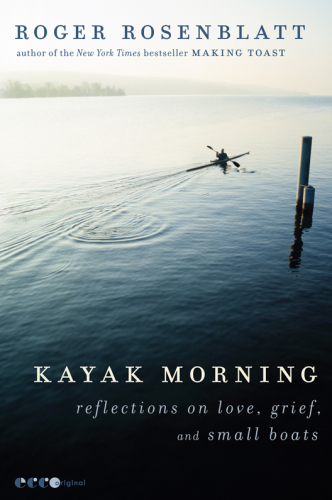
Kayak Morning
Reflections on Love, Grief, and Small Boats
کتاب های مرتبط
- اطلاعات
- نقد و بررسی
- دیدگاه کاربران
نقد و بررسی

Starred review from October 10, 2011
As a follow-up to Making Toast, this memoir is about asking questions that cannot be answered. Where Toast chronicled the aftermath of the author’s 38-year-old daughter’s death, this work explores little about how she died or what happened to those she left behind, but instead focuses on why Rosenblatt cannot come to terms with his grief two and half years later. As Rosenblatt, a writer and professor of English and writing at Stony Brook University, takes up kayaking near his home in Quogue on Long Island, he begins to contemplate his connection to nature and his place in it by observing the sea. The kayak becomes a metaphorical conveyance as he floats from one topic to the next, never anchoring on one thought for long, but instead conjuring elegiac prose on everything from life versus death to personal memories and classic literature. The lyrical nature of the piece, which combines short vignettes, poetic verses, snippets of conversations and meaningful quotations, allows Rosenblatt’s masterful writing skills to shine. In one instance, he describes how his two sons still stand as if their deceased sister is between them, and his words connect in a way that conveys his sadness but also affirms the goodness of life.

August 1, 2011
Esteemed journalist/author Rosenblatt won acclaim and New York Times best-sellerdom with Making Toast: A Family Story, which explained how after his daughter's death he and his wife helped raise their grandchildren. Here, he reflects on the very nature of grief. More penetrating and better written than your standard self-help stuff.
Copyright 2011 Library Journal, LLC Used with permission.

December 15, 2011
Two and a half years after the death of his daughter, Amy, author and essayist Rosenblatt still found himself lost in grief and anger. He took to his kayak in search of peace and found a way to ponder grief, if not lose it. Rosenblatt is poetic in remembrances from his career and personal lifemany of Amy as child, as wife, as mother, as healer. He offers small observations on life and waterways and the careful navigation of both. The quiet moments on Penniman's Creek lend themselves to recollections of literary allusions, as do the more perilous or spectacular adventures on water in Rwanda, Latvia, Galpagos, and Wyoming. Mostly, he struggles with his anger and longing for Amy as he copes with grief, admitting that writing Making Toast (2010) offered only temporary relief. Skeptical of the solace others offer in beliefs in the afterlife, he finds solace instead in quiet mornings alone in the kayak, drifting in the creek and coming to terms with the fact that Amy lives in his love of her. A beautiful contemplation on love and grief.(Reprinted with permission of Booklist, copyright 2011, American Library Association.)

























دیدگاه کاربران